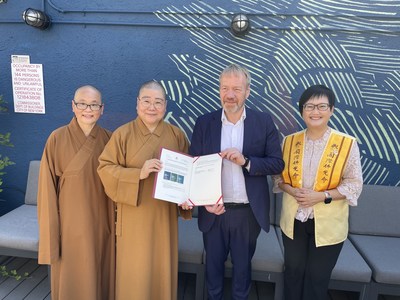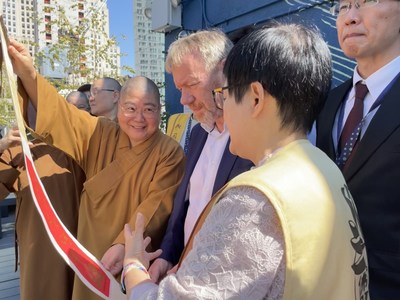NEW YORK, Sept. 22, 2022 /PRNewswire/ — Increasingly, more and more evidence is showing that our planet is experiencing a dangerous decline in its nature, with humans as the main cause. At the same time, ramping up the speed, scope, and level of decarbonization to meet the Net-Zero 2050 challenge has become increasingly important worldwide.
Established in 1992, Buddha’s Light International Association (BLIA) has become one of the world’s top-five international service-organizations. With over 3 million members on 5 continents, BLIA has long devoted its resources to various charity programs—especially those dedicated to community welfare. Now, in response to growing global concerns over the climate crisis, BLIA has initiated several campaigns to contribute to the climate effort.
Vege Plan A, for example, is a campaign that encourages people to adopt a vegetarian diet. According to research, extensive cattle ranching is the main cause of deforestation in virtually every country in the Amazon, accounting for 80 percent of current deforestation. Eating less meat or adopting a vegetarian diet, according to IPCC, can help to curb greenhouse gas emissions, reduce deforestation, and even decrease the risk of pandemic-causing diseases passing from animals to humans.
So far, over 400,000 people from around the world have joined Vege Plan A. To encourage even more participation in this campaign, the BLIA World Headquarters president, the Most Venerable Hsin Bau, launched an action-oriented activity called “VegRun” last November. During the initial event period, participants were encouraged to upload their running logs to a website. Then, for every kilometer completed, BLIA made a donation to provide vegetarian meals to those in need.
Following the success of this inaugural event, VegRun spread to many of BLIA’s worldwide branches. The accumulated mileage, for example, from all of the running logs in North Carolina and San Diego (USA), Ottawa (Canada), Berlin (Germany), Manchester City (Great Britain), France, and more was turned into donations to help with local tree planting; efforts in New Jersey (USA), Denmark, and Sweden ended up helping local NGOs; other donations went to children’s hospitals and charitable food supply efforts. VegRun has even received recognition from worldwide leaders, with the mayor of New York City declaring June 18 “VegRun Day” and the Canadian prime minister, Justin Trudeau, sending a special letter affirming the VegRun.
Another BLIA initiative that is tackling the carbon-negative challenge is T-Earth, with the “T” standing for “Teamwork,” “Tea,” and “Trees,” and “Earth” representing reforestation.
It should be not noted that not all tree plantings are equal. To explain, most tree planting projects plant large numbers of a single tree species, which creates a monoculture forest. It’s been proven that such a forest not only degrades the land but also causes the soil to become acidic. In addition, these forests store only 1/40 of the carbon of a healthy, biodiverse forest. Although monoculture forests are often characterized by their low cost and rapid growth, to really help limit global warming, a species rich forest is the better choice. Yet, since a biodiverse forest can be much more time-consuming and costly to create, its true value is often underestimated, especially economically.
BLIA firmly believes in the T-Earth initiative, and so far, with land donated by Fo Guang Shan, one of the world’s most influential religious groups, and the full support of BLIA’s 1,000-plus worldwide branches and subsidiaries, T-Earth has completed 2 reforestation projects in Taiwan’s 2 climate zones in its first 2 years and is expected expand to other continents.
For the frontline workers in the project to continue their hard work, tree species that generate economic value have been planted in all T-Earth forests. In early 2022, the first sample batch of forest tea from the Formosan Tea Tree was processed. Forest products, like tea, give the public a chance to learn about reforestation and contribute to the T-Earth initiative simply by consuming a cup of tea. T-Earth’s ambitious goal is to mobilize 1,000 companies to plant 1,000 trees in 1,000 cities by 2050.
On September 21 during the 77th session of the UN General Assembly (UNGA 77) and Climate Week NYC, BLIA and the World Climate Foundation signed an institutional-partnership agreement, with both parties addressing the urgent need for restoring biodiversity with nature-based solutions and nature-positive investments.
Media Contact:
George Hu
345195@email4pr.com
0919563599
SOURCE BLIA



